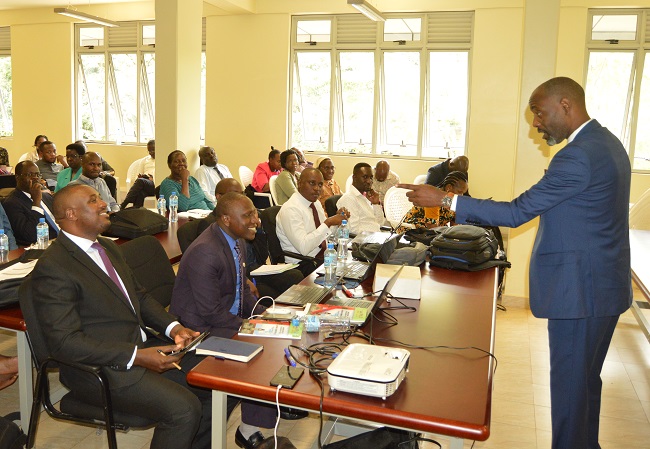The Executive Director for National Planning Authority (NPA) Dr. Joseph Muvawala has highlighted the importance of using persuasion to communicate research for social change. This was during the Makerere University PhD Convention held on 14th November 2019 under the theme; “Communicating Research for Social Change.”
Speaking to Makerere University Postdoctoral Fellows, Dr. Muvawala said that while research is an instrumental factor in causing social change for development, its communication and delivery can either yield positive or negative results. He was much concerned about the vast amount of research that remains unutilized largely due to weak communication procedures when he suggested persuasion as an effective communication tool, researchers can adopt during the dissemination process of their findings.
“Persuasion can shape and reinforce the response of your audience by altering their beliefs, attitudes, intentions, motivation and behaviors. It also helps the researcher to drive his or her audience towards a certain direction,” he said.
He pointed out the critical modes of persuasion developed by Aristotle and how they can be used to effectively communicate research for social change: The three modes are;
Pathos: emotional appeals designed to arouse feelings among the recipients. Emotional appeals are effective when you are trying to influence a behavior or when you want your audience to take immediate action.
Ethos: the credibility of a researcher/ speaker. This includes three dimensions; competence, trustworthiness and dynamism.
Logos: the reasoning, logic and rationality behind the research paper and answers to questions of what is stated.

“To anticipate the reader’s expectations, the author must ensure credibility and authority while undertaking research. His work should reflect well contextualized and evidence based recommendations. the information to be disseminated should have relevant, specific, unbiased and credible facts which are also warranted by citations,” he stated.
Dr. Muvawala outlined some of the research communication strategies for social change and these included;
- Providing a clear, concise and defined thesis
- Providing a clear, organized and conceptualized structure/framework
- Ensuring logical and well-controlled progression of ideas
- Using meaningful transitions and strong sentence-to sentence connections
- Building strong introductions
- Constructing a well-developed argument with strong evidential support
- Building strong conclusions
- Using purposeful and precise word choice
The PhD Convention is an annual event organized by the Directorate of Research and Graduate Training in conjunction with the PhD Forum at Makerere University. According to Mr. Simon Peter Okiror, the President of the PhD Fellows, the PhD Convention presents a platform for both late and early stage PhD students to reflect on their identified research topics.
“The convention also aims at establishing a supportive worldwide community of doctoral students and promoting social and intellectual interactions among students and researchers from academia, industry and government,” he said.
The Director of Research and Graduate Training Prof. Buyinza Mukadasi who is also the Patron of the PhD Fellows at Makerere University recognized the PhD Convention as an important platform to discuss how the on-going research output at Makerere University can be translated into policy that will socially, economically and politically empower the citizens of Uganda to lead better lives. He stressed that the day’s theme; “Communicating Research for Social Change” rightly depicts the role that Makerere University has to play in national and regional development.
“The challenges to society today are increasingly becoming more complex in a world that is witnessing emerging and re-emerging development challenges resulting from health-related epidemics and pandemics, climate change, energy and renewable energy concerns, natural disasters, food insecurity, human rights abuse and conflict and insecurity among others. Makerere University continues to address these challenges through impact oriented research,” he said.

According to Prof. Buyinza, the current drive by Ugandan Public Universities to quickly transition into centre of excellence in graduate training is a commendable sustainability plan. He mentioned that the ultimate benefit of research lies not only in the generation of new knowledge but also in the translation of knowledge into technologies, interventions and strategies effectively and appropriately delivered to the communities.
He applauded the Government of Uganda for recognizing the crucial role of Universities as vital sources of new knowledge and innovative thinking when he said, “The government-funded initiative to strengthen doctoral training and supervision and to develop the institutional capacity of participating universities to conduct and lead internationally-competitive, cutting-edge research will go a long way in supporting Makerere University to realize its vision and strategic goals, 2020-2030.”
Over 100 students presented their research work, proposals and research topics for constructive feedback.
Article by Mak Public Relations Office


 General16 hours ago
General16 hours ago
 General16 hours ago
General16 hours ago
 Humanities & Social Sciences2 weeks ago
Humanities & Social Sciences2 weeks ago
 General1 week ago
General1 week ago
 Agriculture & Environment2 weeks ago
Agriculture & Environment2 weeks ago




